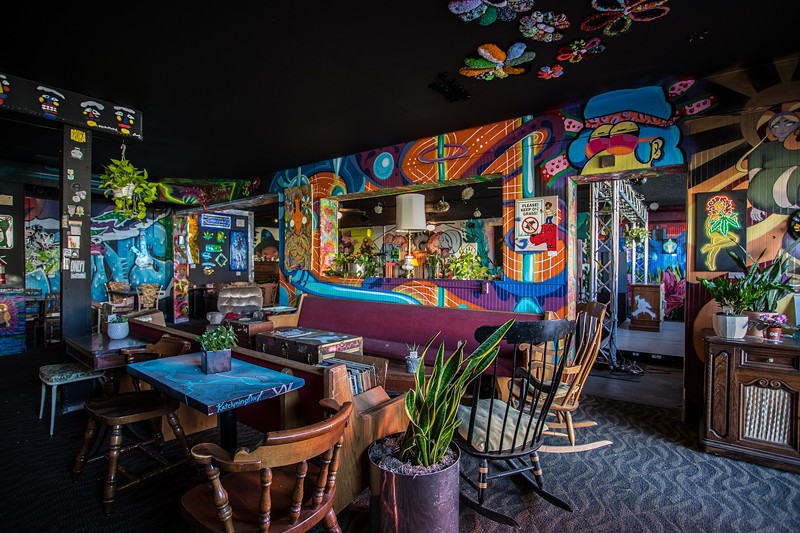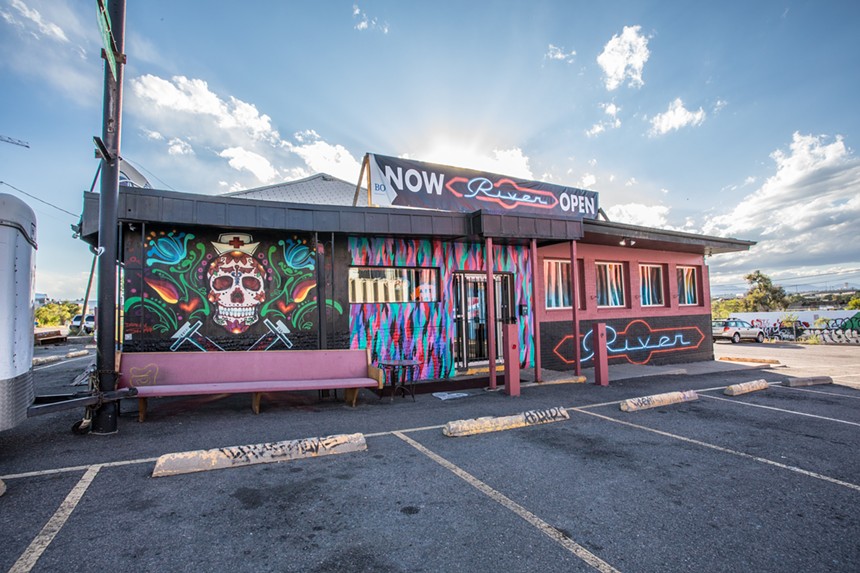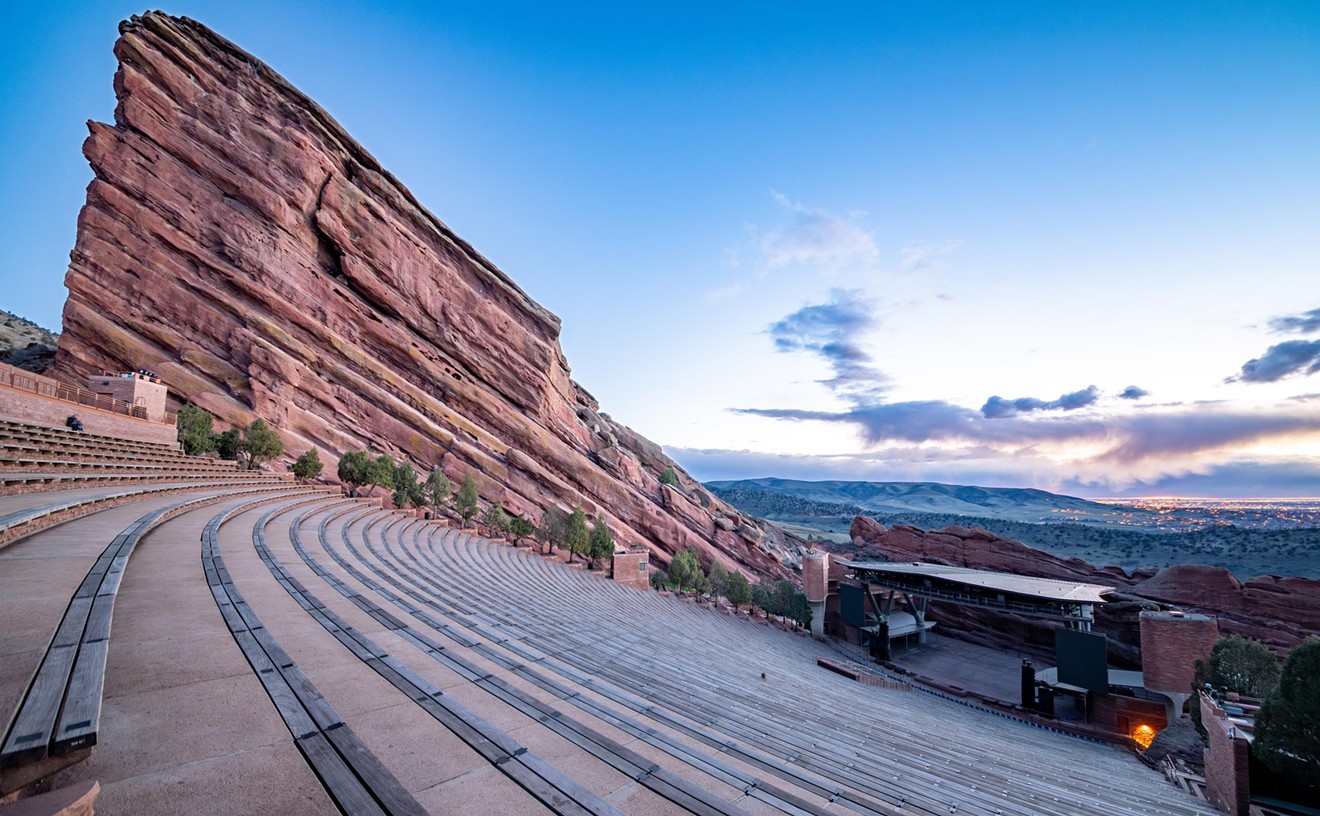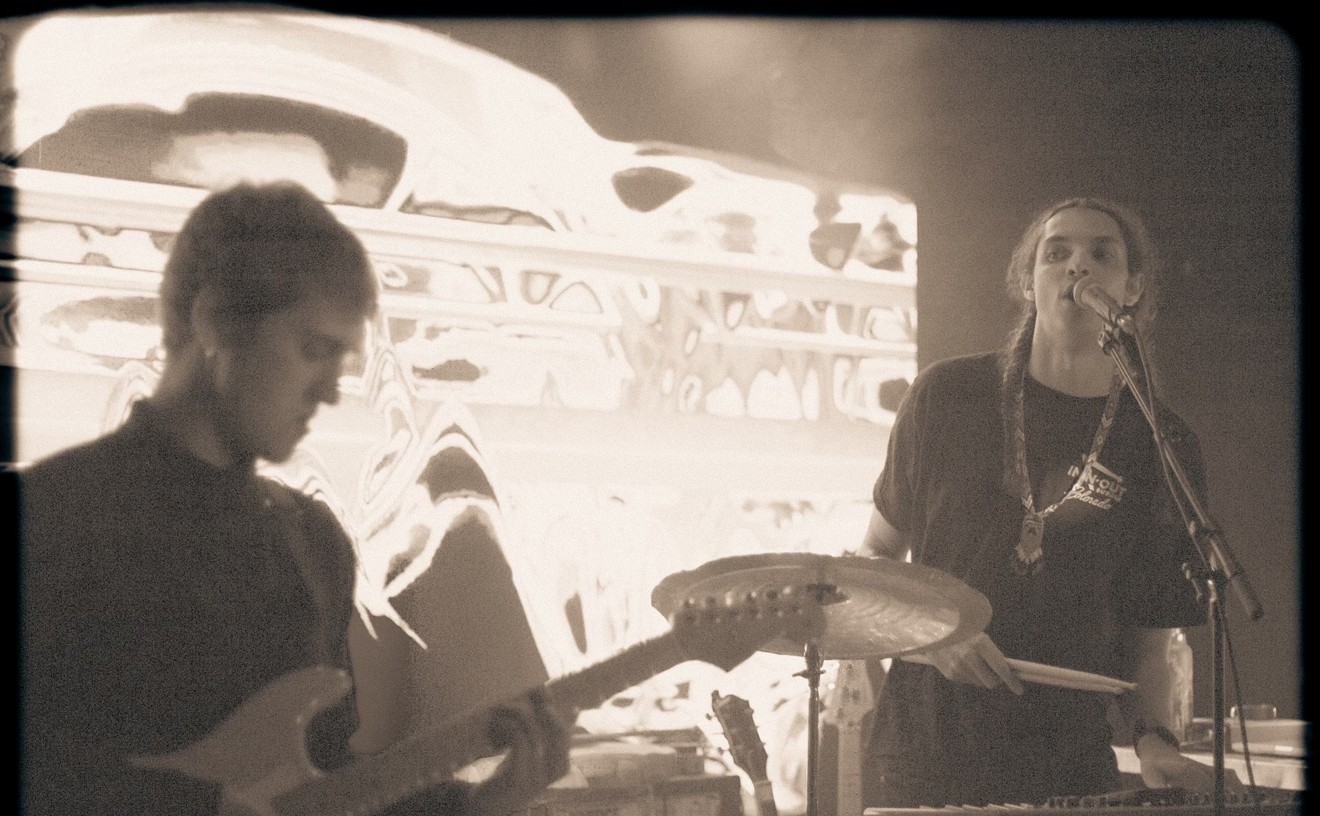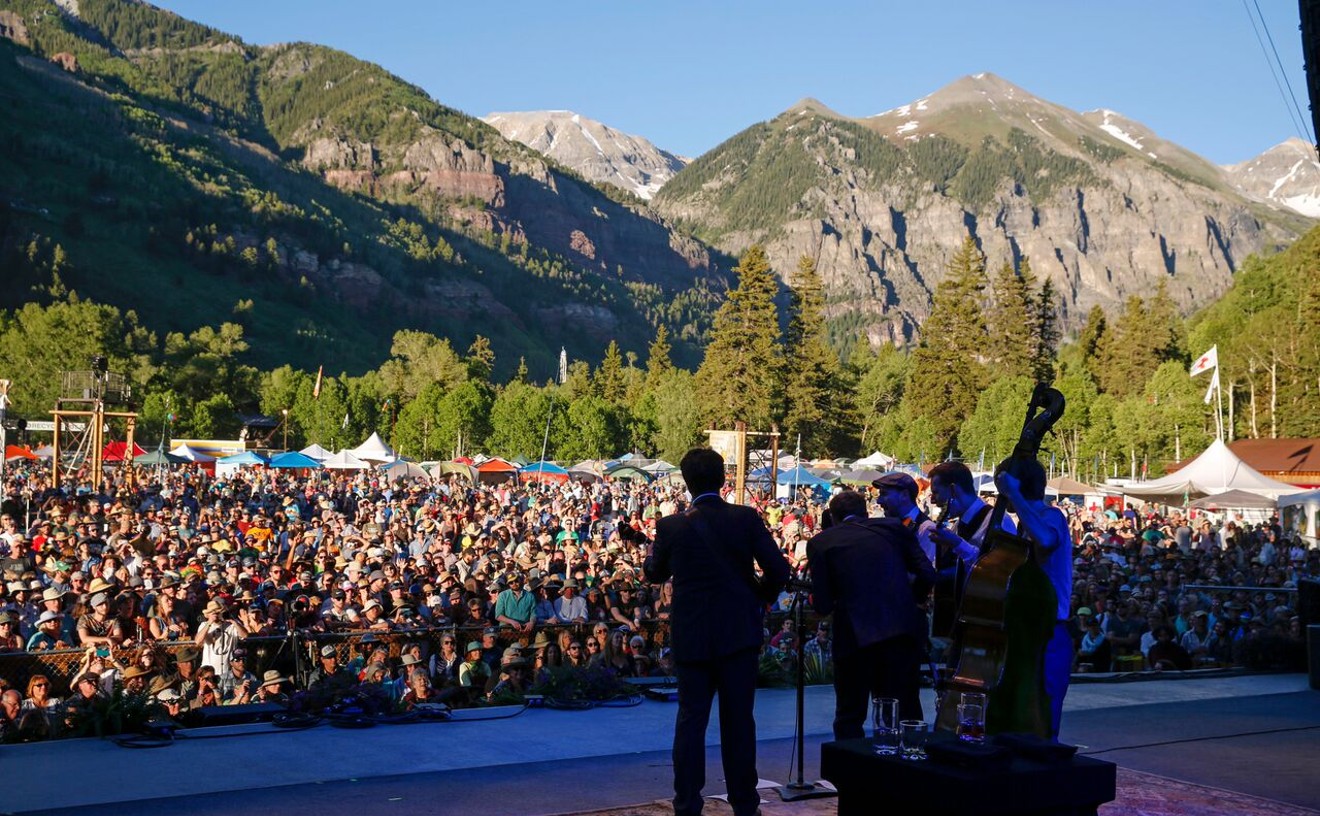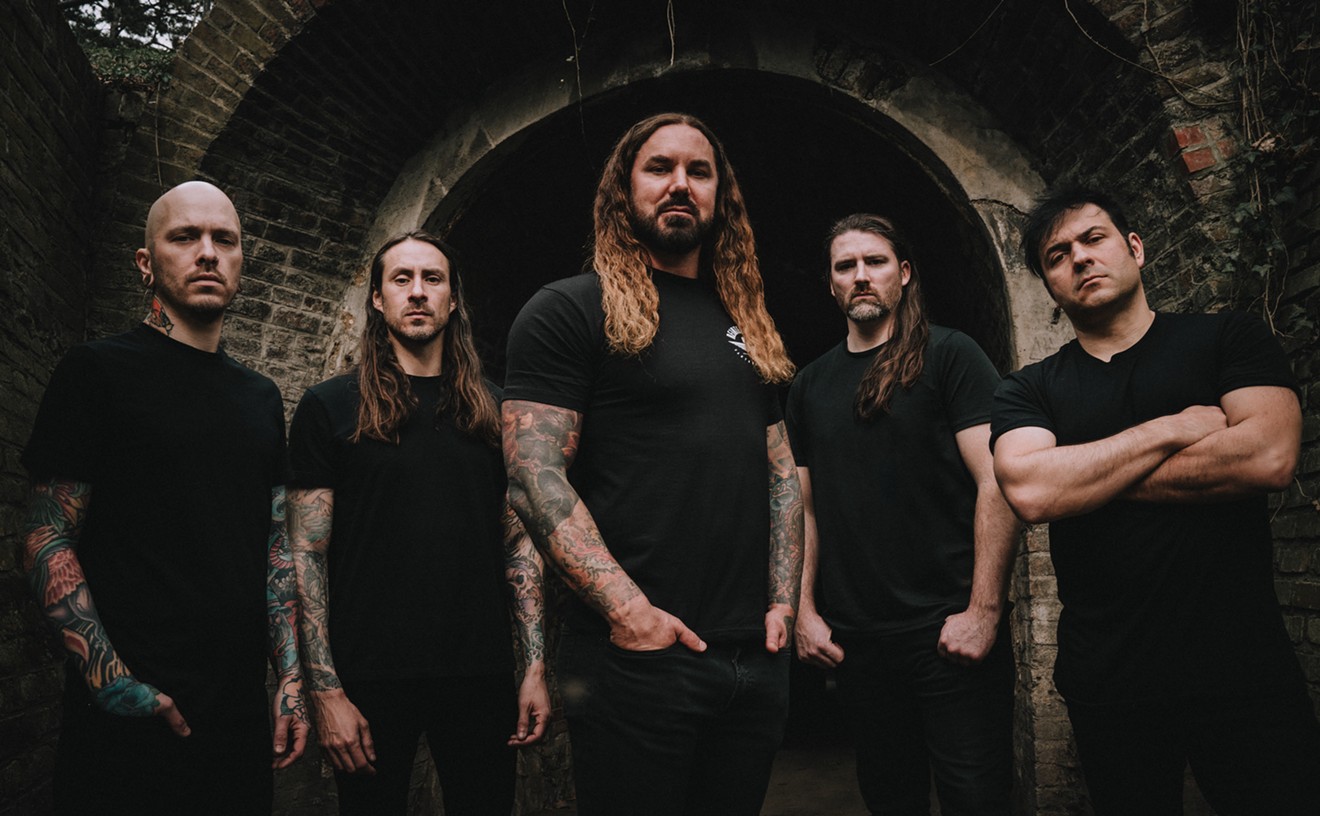“I feel like a lot of business owners talk about community, but I don't think they even know what community is. It’s just the trend where they're like, ‘We have to say this, because it's going to make us look great,'” says Kourisa CdeBaca from behind the bar at River.
But Kourisa and her husband, Gil CdeBaca, walk the talk. As we chat in the art gallery/music venue/watering hole they opened three years ago, a few people poke their heads in the door. “So sorry, we’re not open yet!” Kourisa responds to their interruptions, warm and chipper. “But feel free to look around!”
In just a few hours, though, River will be packed for Beats Bodega. Through that weekly Thursday showcase, innovated by producer Face Defeat, who also runs the venue's Plug in and Play Monday events, and emceed by rapper She Who Won't Be Named, River is now solidifying its status as one of Denver’s only venues with a solid dedication to fostering the hip-hop community.
Kourisa says River started by hosting EDM and band acts — something it still does — but when Beats Bodega was presented as an option, she jumped on it. Since it debuted in March 2023, it has become one of the most popular nights of the week.
“We've done all the genres. We've done drag shows, EDM, hip-hop, reggae, bluegrass; we've done so many different things,” Kourisa says. “But hip-hop is the one that most stuck out to me. Everybody's hiring bands. Everybody's hiring all these other genres, but there's not a whole lot of play going to hip-hop.
“We want to highlight the opportunity here,” she adds, “and how we’re not pay-to-play. And Denver's very much a pay-to-play place.”
That’s something that sets Beats Bodega apart. While other hip-hop open mics allow artists to pay to skip lines or just to enter their names, Beats Bodega is solely about showcasing music from whoever wants to show up.
"The Denver hip-hop community is not against each other, but they could be collaborating more," Kourisa suggests. "We've had artists from Atlanta, St. Louis, New York, Houston, so we're hearing about their communities and how ours is not like that."
She's heard of several hip-hop artists who have moved away from Denver just to find a community. "It's — what's the word that's opposite of collaborative?" she asks.
"Backstabbing," inserts Face Defeat. "They're competing against each other. Not enough scene to go around."
Face Defeat is Jonathan Burke, who moved to Denver from New York City, where he compiled a résumé that included working with the legendary Lyricist Lounge as well as in audio engineering with 50 Cent, Jay Z and P Diddy. He also ran sound for such artists as Missy Elliott, Lil’ Kim, Mary J Blige, Jennifer Lopez and Erykah Badu as they rehearsed for tours at a studio outside the city.
Burke moved to Denver in 2019. “It was a super culture shock,” he reflects. “People are like, 'Friday and Saturday are the days to go out.' Well, that’s every day back home.”
He also noticed a lack of cohesion in the hip-hop community, particularly when it came to consistent weekly events as well as collaborations. And many rappers he spoke with complained about the lack of opportunities. “So what are you doing about it? You’re going to do it or not," he says, throwing up his hands.
“That’s how Beats Bodega came about,” he continues. “That's what I'm bringing to Colorado. I want to bring everything, the whole culture. Here, there’s no culture — it’s cliquish.”
Beats Bodega aims to break up that clique. When Burke heard She Who Won’t Be Named at another open mic, he immediately invited her to emcee Beats Bodega, and soon she'll be hosting Women's Wednesday nights at the venue with other women hip-hop artists. Burke records much of the Beats Bodega shows and consistently shares content to the Beats Bodega Instagram. He will let anyone with a sheer desire to perform on the stage, and then give tips on what to do better — sometimes things as simple as telling the audience their name and how to find their music. While the night has grown slowly, with just twenty or so people at the first iteration, it’s now overflowing. “It’s about consistency,” Burke notes.
But he says that artists are still surprised when he tells them they can get on stage without him first vetting their Instagram pages. “I’m providing the space for you to go up there and do what you got to do,” he says. “I don’t need to see that. … [The audience] wants to see. This is the real life. If you said that to Jay-Z, he’s not going to say, ‘Let me see your account and let me follow you.’ He wants you to show your talent.”
Burke wants to not only show Denver’s talent, but grow it. “I’m really talent-searching,” he says, with a goal to perhaps start a label or talent agency here. He also wants to curate the plethora of reels and content he's created via Beats Bodega and put on YouTube, and create a mixtape from that. “I'm getting to love [doing] promotion and actually seeing the hunger in certain" artists, he says. "Some people just want to touch the stage or just want content; they don’t want to go outside of that."
The crowds at River today are a welcome reward after a lot of hard work, as well as a solid commitment to a for-the-artist vision. River had a rocky start, with the CdeBacas taking on the business with “zero capital,” Kourisa says. “Literally no money.” She and Gil had poured their savings into the place, which they rent from Gil’s uncle, Karl CdeBaca, who owns the building at 3759 Chestnut Place that was once the infamous Welcome Inn.
Kourisa says Karl “would do nothing but complain about the owners of the Welcome Inn.” Gil grew up in the neighborhood and remembers the bar — which began to build a seedy reputation for its rowdy patrons and errant managers — very well. When Karl discovered that the former owner of the Welcome Inn was engaging in shady business practices, “she got kicked out,” Kourisa says.
During COVID, Karl asked Kourisa and Gil if they wanted to take over the building for their own bar. The couple already had a successful embroidery business, but the opportunity seemed too great to pass up. After refunding their embroidery customers $20,000 (“We pissed a lot of people off,” Kourisa admits), Kourisa and Gil poured the rest of their savings into River, which opened in June 2021.
Before hip-hop entered the picture, Kourisa’s goal was to fill the space with art to make it look like an alley in RiNo. She issued a call for artists on Instagram, and “none of the bigger artists wanted anything to do with it,” she recalls.
“It was beautiful, though, because it ended up being all new artists who just wanted an opportunity to paint in RiNo. And that’s when I learned about gatekeeping,” she adds with a laugh.
“We started posting about it, and then all the heavy hitters seeing the little guys, they wanted to come in, too,” she continues. “I lost count at probably 500 artists that came through in the first year we were open...and so I thought the music scene was going to be the same. And it was, but not at first.”
When she and Gil started bringing music into River, “I knew nothing about the music scene," Kourisa admits.
She soon discovered that venues, like artists, could be taken advantage of by promoters. One of the first promoters River worked with received 100 percent of the ticket sales, but then began asking for cuts of the bar’s drink sales, too. Turned out the promoter was also charging artists up to $1,200 to play. Needless to say, River cut those ties.
The venue eventually started making a name as a place to perform through word of mouth, and event promoters such as Double Up started bringing their shows to the bar. “We don't charge anybody to do anything here,” Kourisa notes. “It’s just mutually beneficial. We keep our liquor sales, you keep your door sales.”
While that business model hasn't brought in the cash that River could be getting if it operated like other venues, there's satisfaction in providing a platform for artists with a vision, such as Burke. “Why not create a space where you can keep your ticket sales?” Kourisa says. “I don't really go around visiting other places to see what they're doing. I just hear about, ‘Well, it costs $100 to even put on a show there, and they keep 40 percent of our ticket sales.’ Which I get, because we struggle.” But they’d rather struggle than dilute their commitment to the artists.
As the high energy at Beats Bodega suggests, that commitment was more than necessary for the hip-hop community. "We've learned hip-hop was our niche," Kourisa says. "There's so much opportunity there. ... I remember saying we're going to be known for this — we're going to be known for hip-hop and rap, true, underground hip-hop."
"It's just good people, good vibes and good music coming in," Gil concludes, "and coming together as a community and making us one."
Beats Bodega, every Thursday starting at 9 p.m., River, 3759 Chestnut Place, $10.
[
{
"name": "Air - MediumRectangle - Inline Content - Mobile Display Size",
"component": "12017618",
"insertPoint": "2",
"requiredCountToDisplay": "2",
"watchElement": ".fdn-content-body",
"astAdList": [
{
"adType": "rectangle",
"displayTargets": "mobile"
}
]
},{
"name": "Editor Picks",
"component": "17242653",
"insertPoint": "4",
"requiredCountToDisplay": "1",
"watchElement": ".fdn-content-body",
"astAdList": [
{
"adType": "rectangle",
"displayTargets": "desktop|tablet"
},{
"adType": "rectangle",
"displayTargets": "desktop|tablet|mobile"
}
]
},{
"name": "Inline Links",
"component": "18838239",
"insertPoint": "8th",
"startingPoint": 8,
"requiredCountToDisplay": "7",
"maxInsertions": 25
},{
"name": "Air - MediumRectangle - Combo - Inline Content",
"component": "17261320",
"insertPoint": "8th",
"startingPoint": 8,
"requiredCountToDisplay": "7",
"maxInsertions": 25,
"watchElement": ".fdn-content-body",
"astAdList": [
{
"adType": "rectangle",
"displayTargets": "desktop|tablet"
},{
"adType": "rectangle",
"displayTargets": "desktop|tablet|mobile"
}
]
},{
"name": "Inline Links",
"component": "18838239",
"insertPoint": "8th",
"startingPoint": 12,
"requiredCountToDisplay": "11",
"maxInsertions": 25
},{
"name": "Air - Leaderboard Tower - Combo - Inline Content",
"component": "17261321",
"insertPoint": "8th",
"startingPoint": 12,
"requiredCountToDisplay": "11",
"maxInsertions": 25,
"watchElement": ".fdn-content-body",
"astAdList": [
{
"adType": "leaderboardInlineContent",
"displayTargets": "desktop|tablet"
},{
"adType": "tower",
"displayTargets": "mobile"
}
]
}
]

